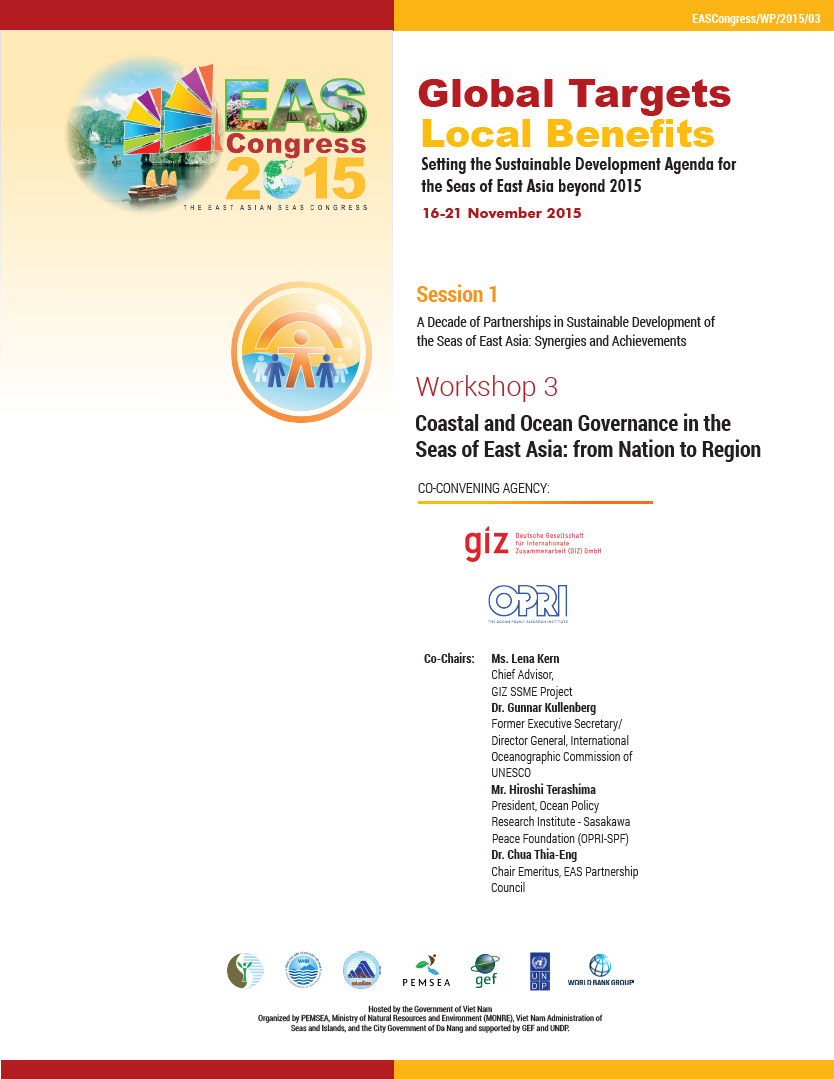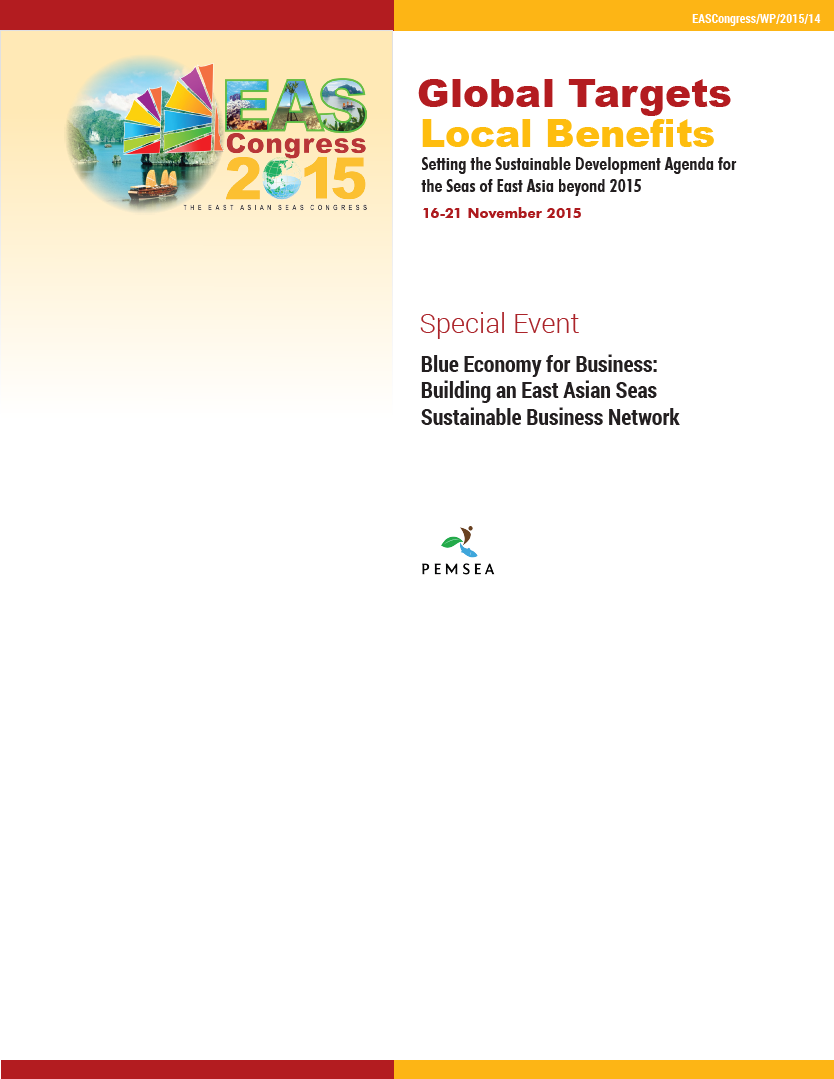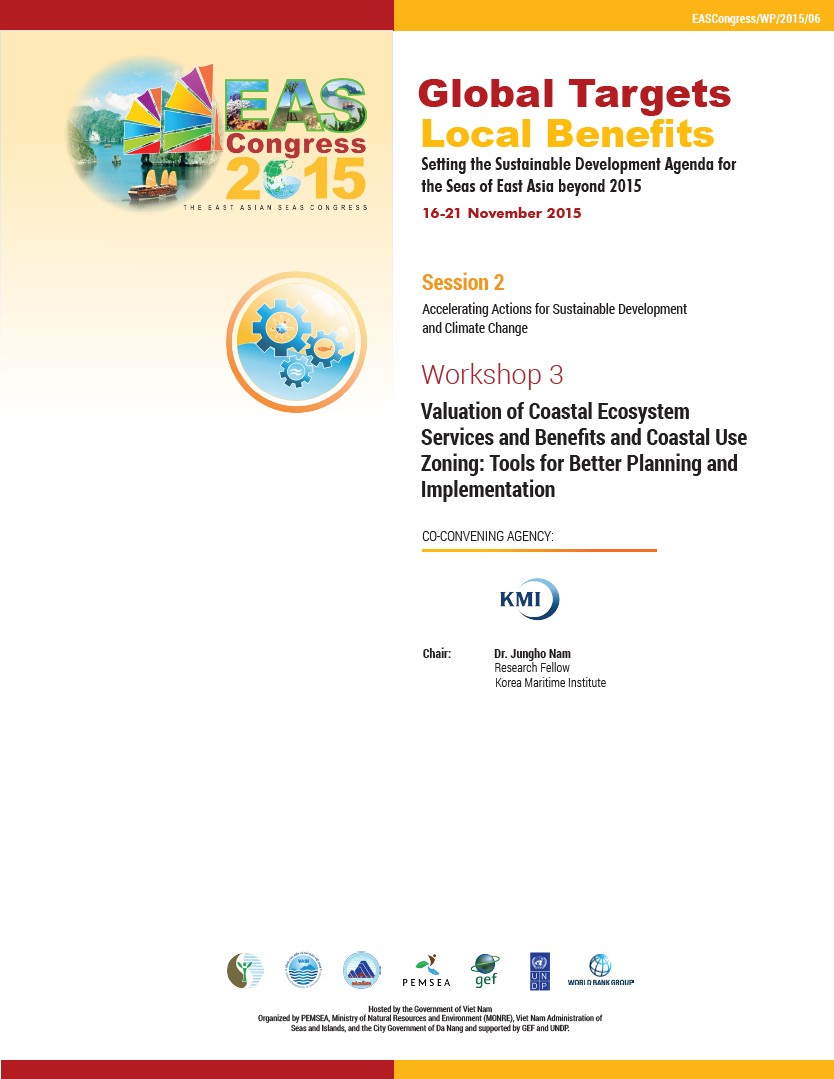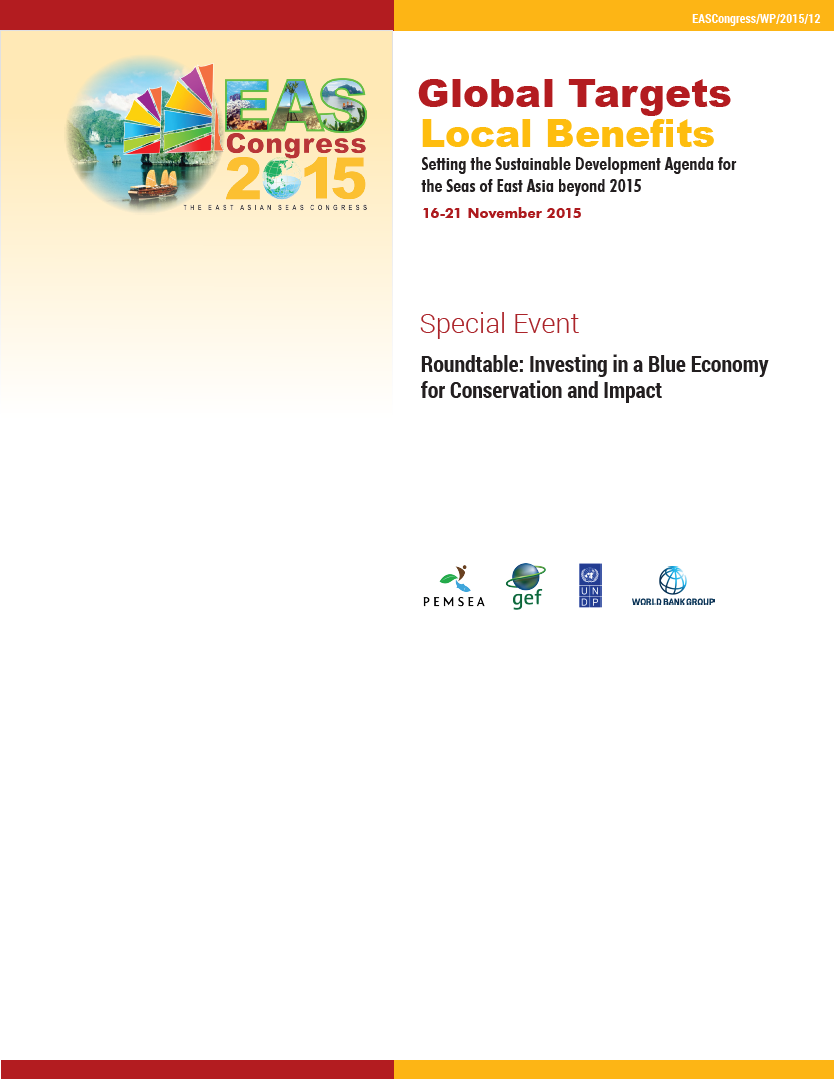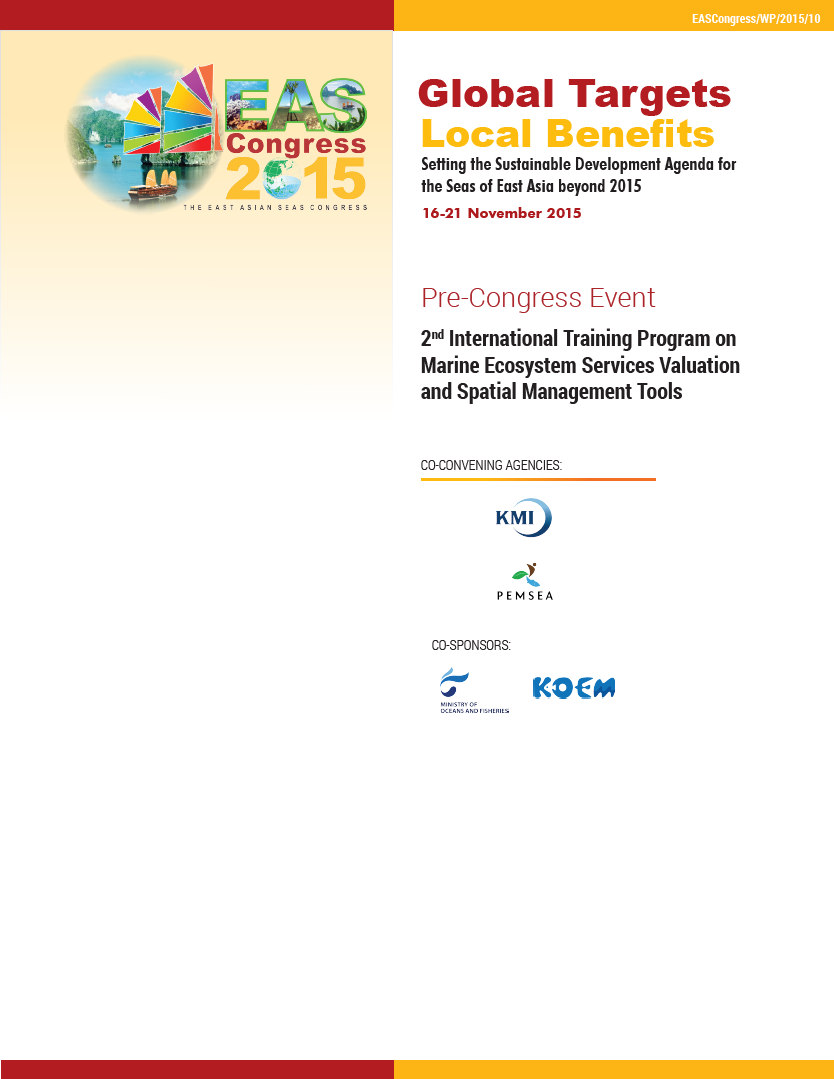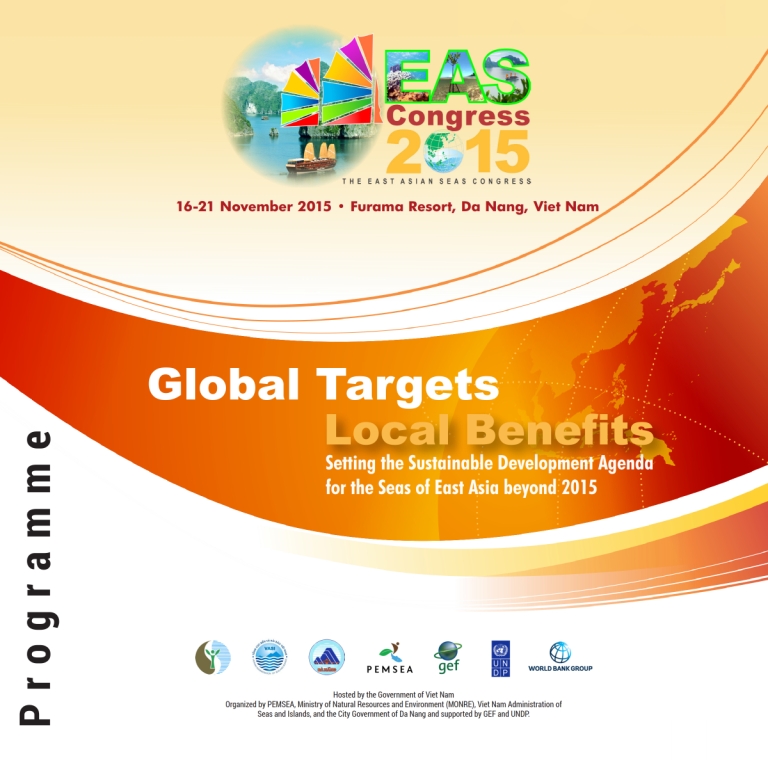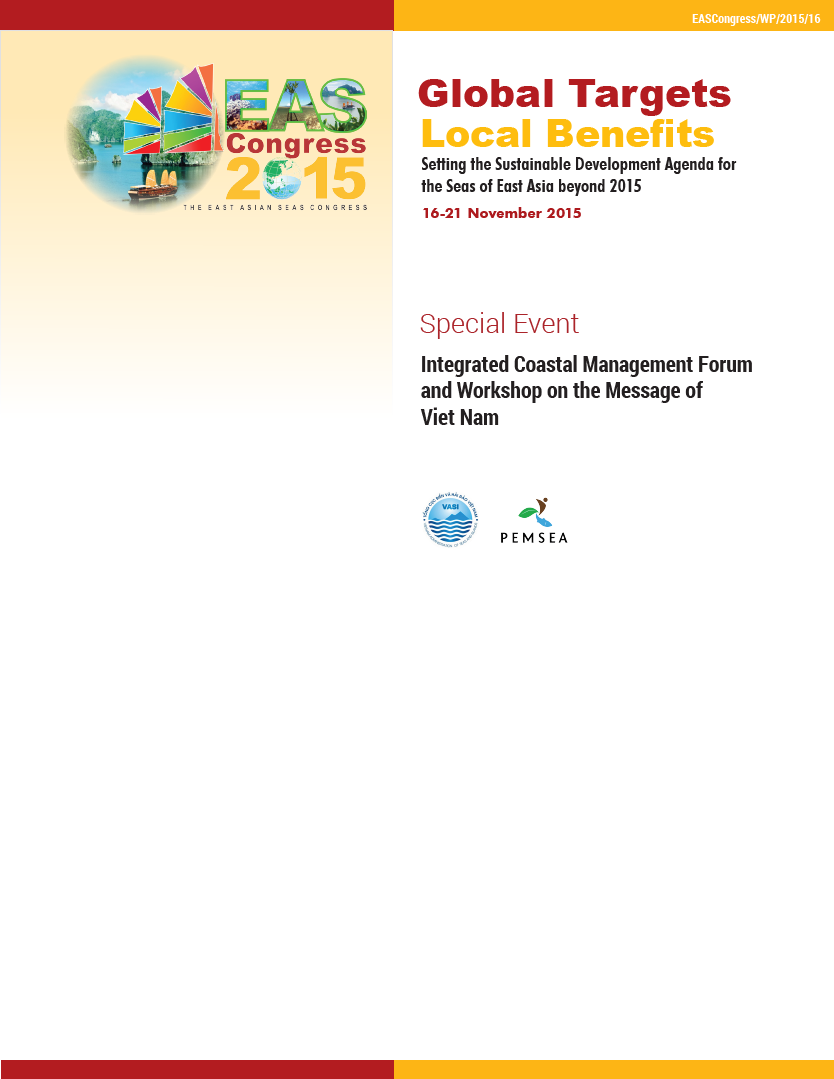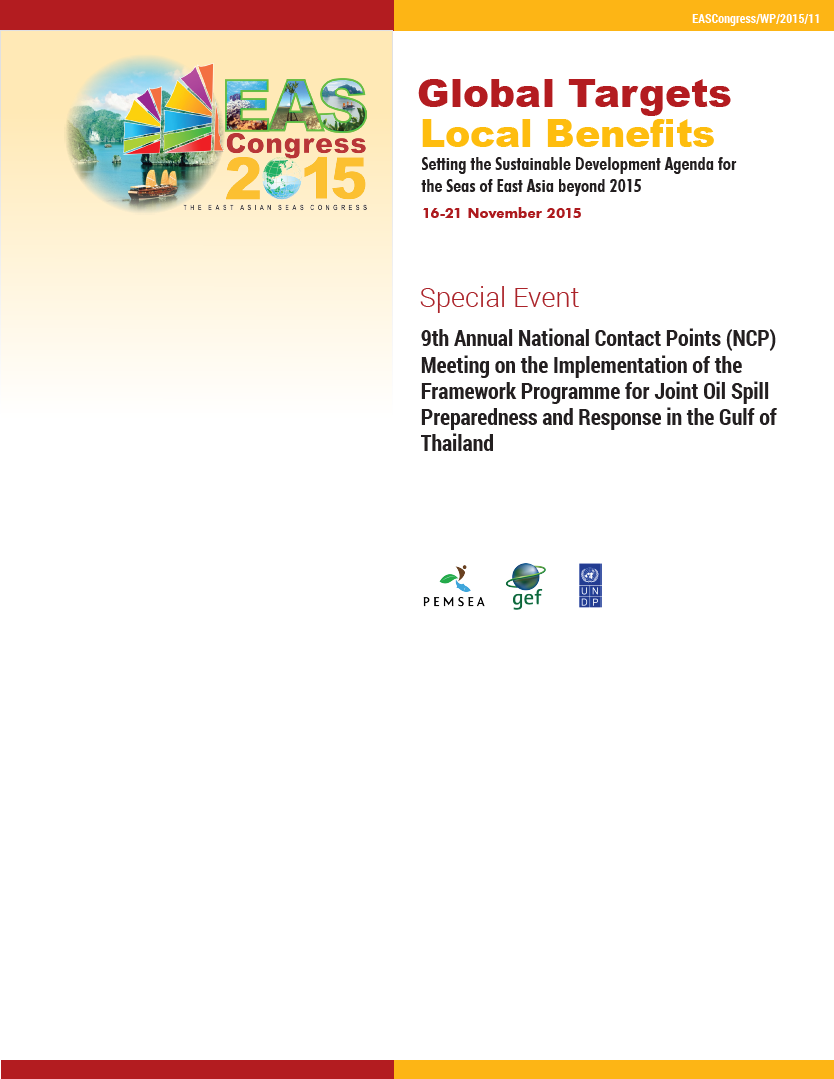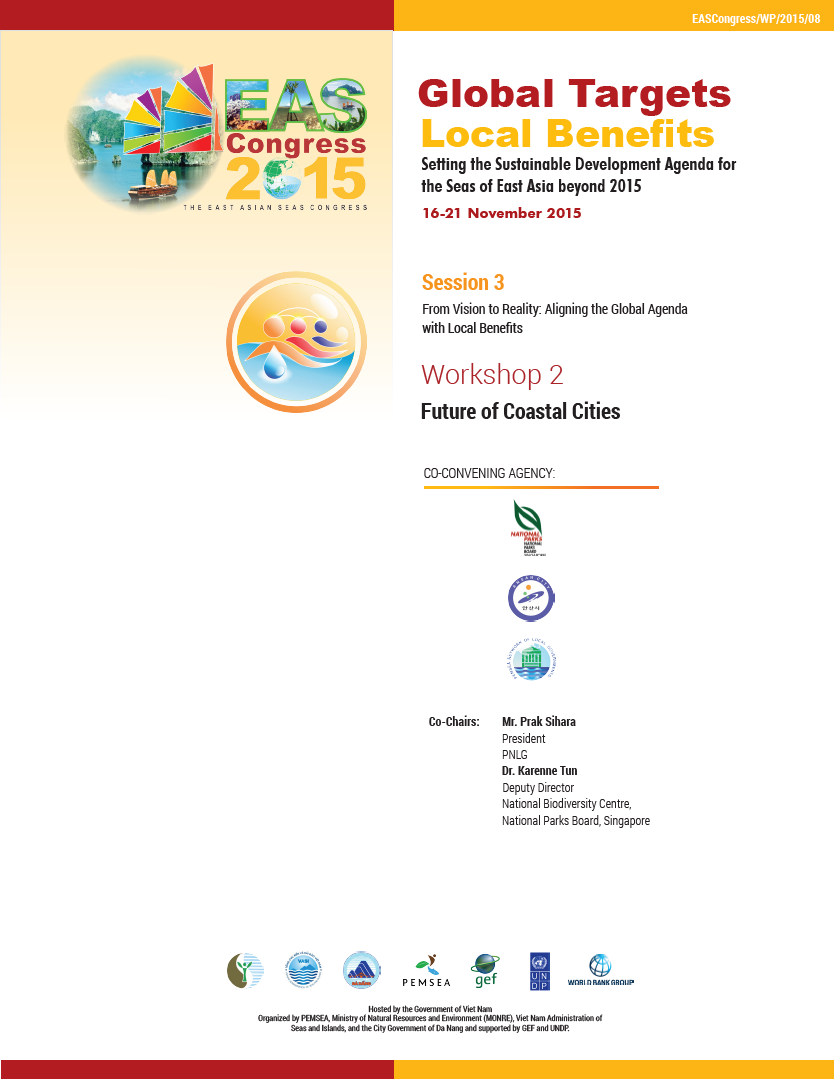
Breadcrumb
-
Proceedings of the workshop on Coastal and Ocean Governance in the Seas of East Asia: from Nation to Region (EASC2015 Session 1 Workshop 3)
The six Large Marine Ecosystems (LMEs) and subregional seas of East Asian region are experiencing physical, ecological and socioeconomic changes associated with infrastructure development, urbanization, extreme climate events, land and sea based activities, and population increase. International cooperation at regional and LME levels has facilitated in many ways collaborative responses among countries to the challenges and uncertainties with countries’ adoption of ocean policies and measures in alignment with the regional action programs such as the strategic action programme (SAP) and regional sustainable development strategy.
What are the drivers that have shaped the regional coast and ocean governance? What achievements and impact have these regional governance mechanisms made in addressing overfishing, eutrophication, loss of coastal and marine biodiversity and other transboundary issues in the last decade? What are the gaps in our understanding of the coasts and oceans? What are the innovative implementation and governance mechanisms for SAPs and the regional strategy? What should the collaborating countries do in terms of policy and regulatory framework and institutional arrangements to make these regional mechanisms and initiatives work more effectively? This workshop is designed to facilitate regional and national initiatives to respond to the ocean agenda enshrined in the Future We Want at Rio+20 and SDGs.
-
Proceedings of Blue Economy for Business: Building an East Asian Seas Sustainable Business Network (EASC2015 Special Event)
At the EAS Congress 2012, ministers from 10 countries in the region signed the Changwon Declaration, calling for an increased focus on developing a blue economy in the region. PEMSEA recognized that the concept of blue economy lacked definition, particularly for the private sector, and set out to conduct research on the topic, including companies from several industries. PEMSEA launched a new report at the Congress on Blue Economy for Business in East Asia (available at http://www.pemsea.org/our-work/blue-economy). The report describes the importance of coastal and marine ecosystem services to the economies of East Asia (up to 20% of GDP for some countries in the region), and the impact on business from continuing degradation of ecosystems (business value related to these risks could be as high as 25‐70% of earnings). The concept of blue economy has been evolving, primarily with governments and intergovernmental organizations, but with increasing interest from the private sector. The report defines blue economy as “the set of environmentally and socially sustainable commercial activities, products, services and investments dependent on and impacting coastal and marine resources”.
-
Proceedings of the workshop on the Valuation of Coastal Ecosystem Services and Benefits and Coastal Use Zoning: Tools for Better Planning and Implementation (EASC2015 Session 2 Workshop 3)
This workshop looked into the different ecosystem valuation and coastal use zoning frameworks and methodologies, as well as their linkages and applications at the local level. The workshop brought together more than 100 practitioners, researchers, policymakers, local stakeholders and communities.
A total of 12 case studies from China, Indonesia, RO Korea, Malaysia, Philippines, Thailand and Viet Nam, as well as regional and international organizations and projects, were presented. The case studies outlined the experiences in the use of tools and methodologies on valuation and zoning and their application to management of specific habitats and resources, such as seagrass, coral reefs, mangroves, fisheries and tourism, as well as their application in addressing various problems including coastal reclamation and habitat exploitation. Three panel discussants from the PEMSEA ICM Learning Centers and university partners identified areas where such tools and experiences can be scaled up in their respective sites/countries, as part of the GEF/UNDP/PEMSEA regional initiative on Scaling up the Implementation of the Sustainable Development Strategy for the Seas of East Asia (SDS‐SEA).
-
Proceedings of the roundtable on Investing in a Blue Economy for Conservation and Impact (EASC2015 Special Event)
This roundtable brought together members of the investment community and others working to develop models and approaches for scaling up sustainable development of shared coasts and oceans. Topics covered included models in marine sustainable development and emerging opportunities in sustainable coastal development. The roundtable generated the following recommendations:
- Further test the platform with investors and project developers, for example, by engaging with other World Bank‐funded project to pilot beta version of the platform.
- Develop a portfolio of service providers and funding options for moving projects from concept to feasibility, based in real business rigor as a foundation for long‐term sustainability.
- As part of platform design, consider ways that the platform can facilitate investment in small and medium enterprises in particular.
- Develop in‐person meetings, forums and other services for project developers and investors to complement the online platform.
- Explore opportunities for supporting local governments in establishing an enabling environment for investment.
- Engage PEMSEA’s networks, in identifying good quality potential investment projects.
-
Proceedings of the 2nd International Training Program on Marine Ecosystem Services Valuation and Spatial Management Tools (EASC2015 Pre-Congress Event)
The Training Program on Marine Ecosystem Valuation and Spatial Management Tools was attended by over 40 participants from various countries including Cambodia, China, DPR Korea, Lao PDR, Malaysia, RO Korea, Thailand, Timor‐Leste, United Kingdom, Vietnam, Indonesia and. The special pre‐congress event brought together academia, government and practitioners to encourage the wider application of tools and methodologies in other sites and countries in the East Asian region and globally.
-
The East Asian Seas Congress 2015 : Global Targets - Local Benefits : Setting the Sustainable Development Agenda for the Seas of East Asia beyond 2015 (Programme)
Download the East Asian Seas (EAS) Congress 2015 program to read about the events, workshops, roundtable discussions and ministerial meetings that took place in Danang, Vietnam.
-
Proceedings of the Integrated Coastal Management Forum and Workshop on the Message of Viet Nam (EASC2015 Special Event)
PEMSEA and VASI co‐convened the ICM Forum and Workshop on the Message of Viet Nam as one of the Special Events of the Congress. The forum was held on 19 November 2015 and was attended by representatives from international organizations, national agencies and coastal provinces.
The first set of presentations looked at the various transboundary concerns in the region that would require regional cooperation and the initiatives being undertaken by Viet Nam in conformity with international norms and agreements on ocean and coastal governance. The second set of presentations reviewed the evolution of ICM practices in Viet Nam and examined the efforts of various agencies that contributed to strengthening ICM implementation in the country.
-
Proceedings of the 9th Annual National Contact Points (NCP) Meeting on the Implementation of the Framework Programme for Joint Oil Spill Preparedness and Response in the Gulf of Thailand (EASC2015 Special Event)
The 9th National Contact Points Meeting on the Implementation of the Framework Programme for Joint Oil Spill Preparedness, Response and Cooperation in the Gulf of Thailand was held on 17 November 2015 at Furama Resort Hotel, Da Nang, Viet Nam. The Meeting was held as a side event of the East Asian Seas Congress 2015.
Twenty (20) key officials representing the Merchant Marine Department and Ministry of Environment of Cambodia, Marine Department of Thailand, Thailand Oil Industry Environmental Safety Group (IESG), Vietnam National Search and Rescue Committee (VINASARCOM), Vietnam Administration for Seas and Islands (VASI), and Vietnam National Southern Oil Spill Response Center (NASOS) participated in the meeting. The Partnerships on Environmental Management for the Seas of East Asia (PEMSEA) was represented in the meeting.
-
Proceedings of the workshop on the Future of Coastal Cities (EASC2015 Session 3 Workshop 2)
This workshop aimed to: (a) highlight the need for, and critical role to be played by cities and local governments in the region to lead the way in sustainable development including combating climate change; (b) increase awareness on the progress, achievements and good practices in sustainable development and climate change mitigation and adaptation among cities and local governments in the region using ICM as the management framework for action; and (c) explore the solutions and opportunities for sustainable development at the region’s local settings by strengthening PNLG initiatives in sustainable development and climate change through linkages with other international networks of cities and local governments and their programs.
